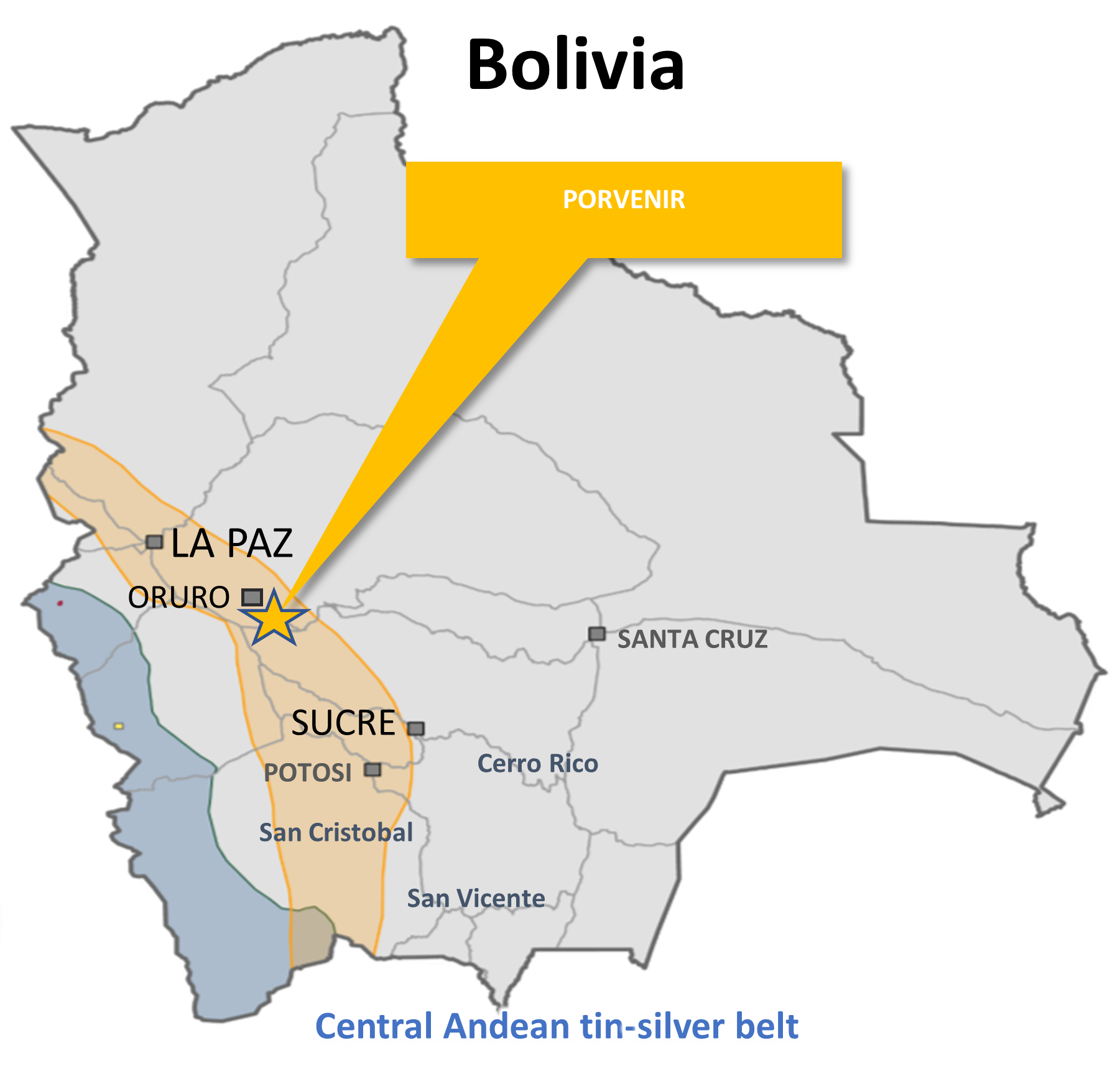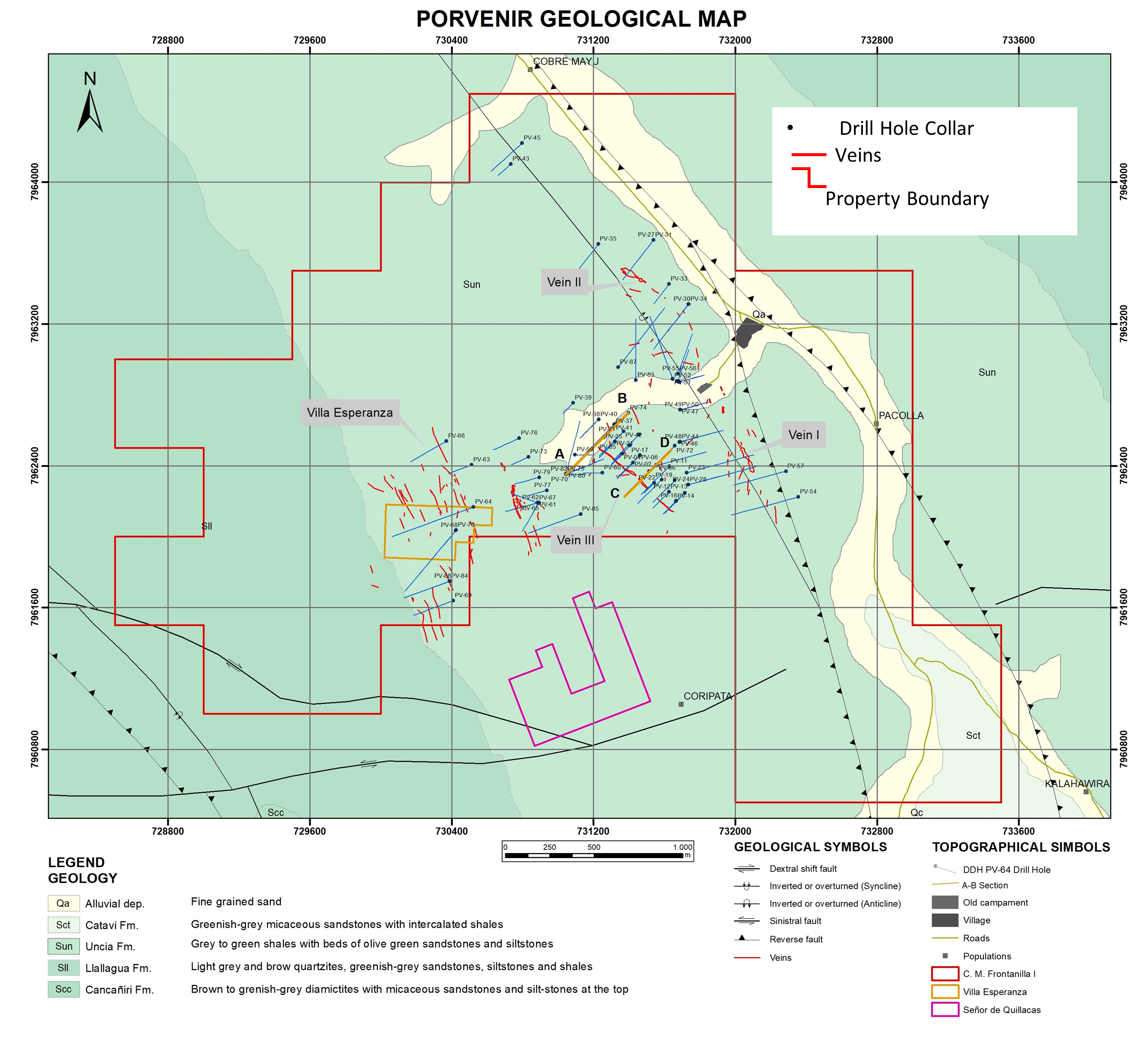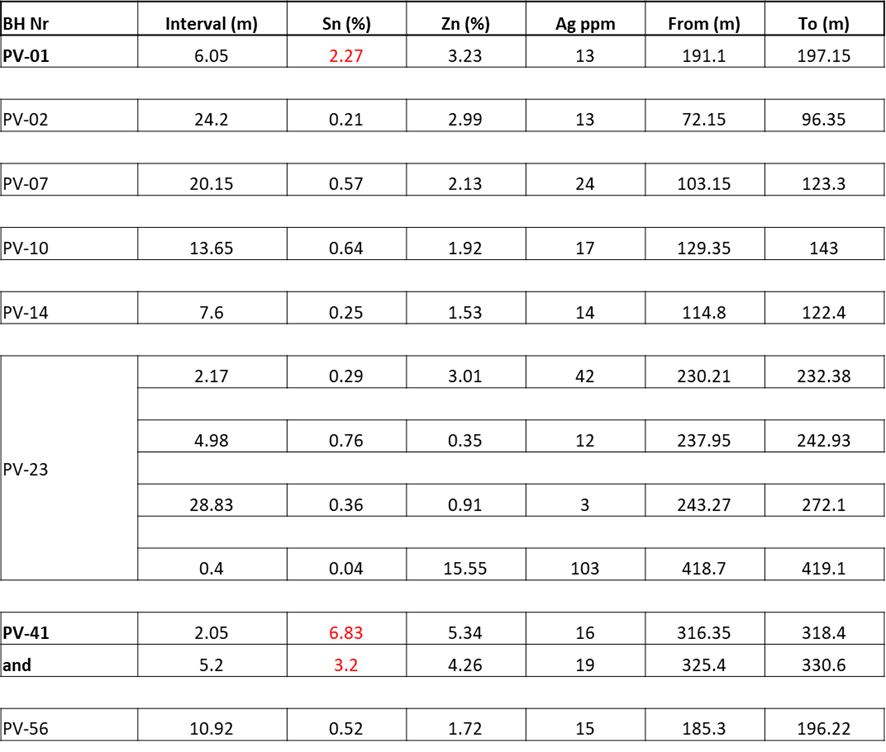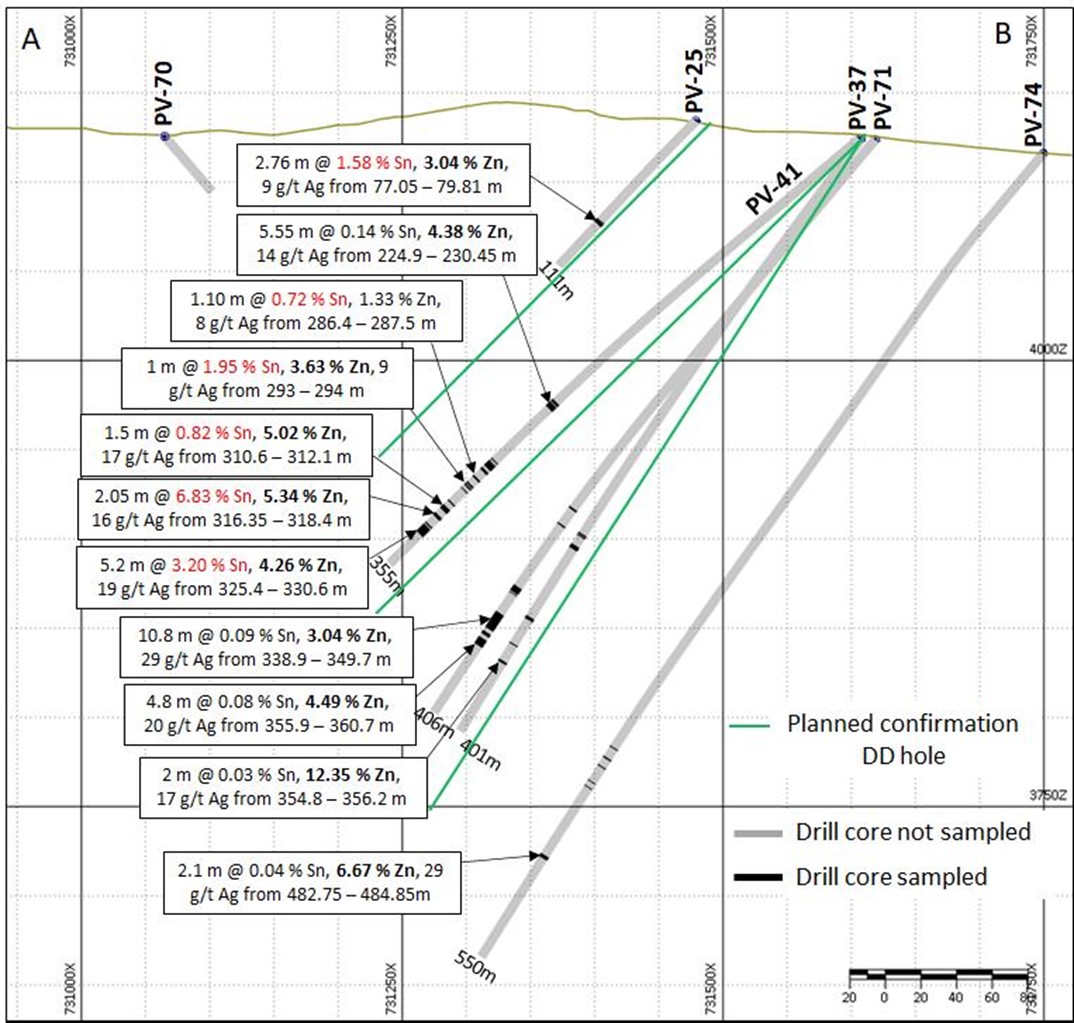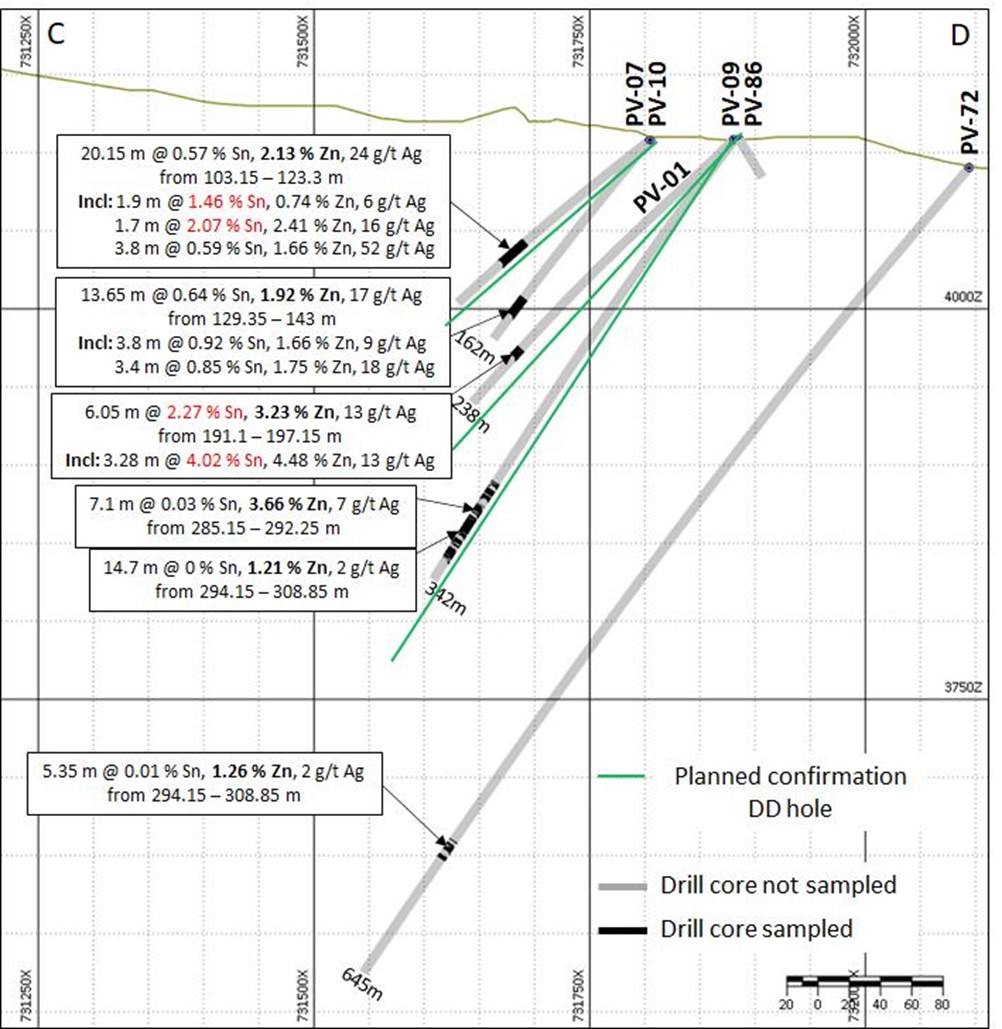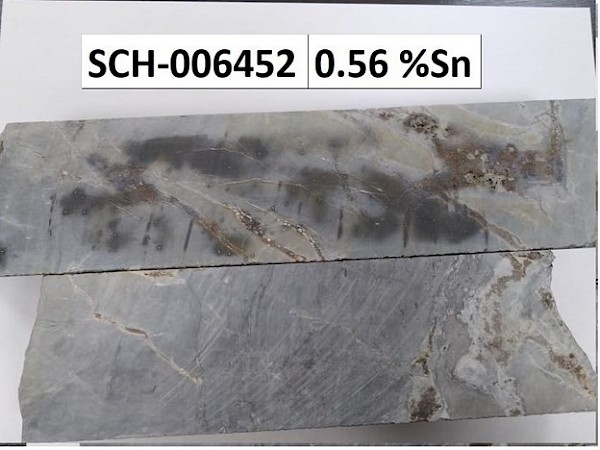Vancouver, British Columbia: Whitehorse Gold Corp. (“Whitehorse Gold” or the “Company”) (TSXV: “WHG”, OTCQX: “WHGDF”) announces that its wholly-owned subsidiary, Stannum Metals Corp., on August 22, 2022 signed an agreement to acquire a 100% interest in a private Bolivian incorporated mining company (the “Porvenir Tin Company”) from its three shareholders (the “Vendors”). The Vendors are Bolivian nationals and arm’s length parties.
The Porvenir Tin Company‘s main asset is the Porvenir tin-zinc-silver-lead polymetallic mineral Project (the “Property”), or ATE (Temporary Special Authorization), located in the Oruro Department, Bolivia (see Figure 1 for location). The Property was subjected to some small-scale, historic mining and was explored and drilled by Japanese mining company, Dowa Metals and Mining Company (“Dowa”) in 2005 (see Figure 2 for Property map and drill locations). In total, Dowa completed 88 diamond drill holes in approximately 25,000 metres ("m”) based on the data acquired by the Company from an independent source.
A review of Dowa’s historic drill assay results shows they had selectively sampled cores with obvious massive pyrite/sphalerite. Dowa identified more than 19 tin-zinc veins assaying up to 941 grams per tonne silver, 6.34% lead, 28.1% zinc, 10.20% tin, and 500 grams per tonne indium (see Figure 3 & 4 for two drill sections).
Two best historic drill holes are hole PV-41, which intercepted a 15.05 m interval (from 316 m to 331 m) grading 2.04% tin, 2.4% zinc, and 11 grams per tonne silver (Figure 3), and hole PV-01, which intercepted a 6.05 m interval (from 191 m to 197 m) grading 2.27% tin, 3.23% zinc, and 13 grams per tonne silver (Figure 4).
The Company’s geologists sampled a 0.5 m long uncut Dowa core with alteration but no obvious sulfide and returned 0.56% tin and 0.34% zinc, suggesting Dowa may have missed tin mineralization intervals that are low in other sulfide mineralization (see figure 5). After closing the acquisition and before being granting a drilling permit by the Bolivia Government, the Company plans to cut, and re-sample Dowa’s historical drill cores stored on site.
Major Terms of the Agreement
The Company will pay a total of US$1.75 million to acquire 100% of the Porvenir Tin Company in the following instalments:
- Payment of US$750,000 to the Vendors for 51% as an initial, non-refundable down-payment following the signing of the Agreement.
- On the first anniversary of signing, Whitehorse Gold will pay a further US$750,000 to the Vendors for the remaining 49% of the Tin Company.
- On the second anniversary of signing, a further US$250,000 will be payable to the Vendors.
- There is no finders fee payable in connection with this transaction.
Closing of the transaction is subject to regulatory approval, and other conditions as set out in the Agreement.
Figure 1. Location of Porvenier in Bolivia
Location and History
At an elevation of approximately 4,100 m, the 11.25 square kilometres (km²) Property is located in the Oruro Department of Bolivia (Figure 1), approximately 25 km Southwest of the Huanuni Mine, the largest tin mine in Bolivia. Access is relatively easy with paved access from Oruro for 60 km and dirt road access for 10 km from the town of Venta Y Media.
Geology and Mineralization
The mineralization is hosted within near vertical NNW to NW trending structures which occur within Silurian age (423 – 419 Ma) clasticsediments comprising interbedded and layered units of sandstone and shale. The mineralization comprises a stockwork framework formed by a series of mineralized stringers, < 1cm, as well as mineralized quartz veins which range in thickness from 1 to 30 cm.
Tin is hosted within cassiterite (SnO2), while sphalerite (ZnS) is the primary zinc mineral, with silver being hosted in tetrahedrite. Quartz, pyrite, siderite, barite, and kaolinite account for the majority of gangue and alteration mineral assemblages.
Historical Exploration
In 2005 Dowa conducted a 25,000 m, 88 hole diamond drill program (Figure 2) at Porvenir. Five clusters of Dowa drill holes (mineralized zones) were completed by Dowa. Figure 2 shows the Property boundary highlighting the location of the historic drill holes, mineralized zones, and the location of the two cross sections included herein.
Figure 2: Property boundary at Porvenir
Table 1: Historic ,Tin (Sn), Zinc (Zn), and Silver (Ag) Mineralized Drill Intercepts
Figures 3 and 4 show two NE-SW drill cross sections (A-B and C-D) of historic drilling results (looking NW). In the cross sections, Dowa’s drill core samples are marked in black and clearly show selective sampling practice that might have missed tin intervals with low sulfide contents.
Figure 3: Drill cross section A-B
Figure 4: Drill cross section C-D.
Figure 5: A 0.5m long section of Dowa core with alteration but no obvious sulfide and returned 0.56% tin and 0.34% zinc from WHG assay testing.
Donald J. Birak, independent consultant geologist and Qualified Person as defined under National Instrument 43-101, has conducted a site visit to this Property and has reviewed and approved the scientific and technical information in this news release. As only a limited amount of historic core and no assay samples exist for inspection or resampling, the Qualified Person was not able to validate the historic drill results and the Qualified Person is relying on the historic drill results only as indicative of the style of mineralization on the Property.
About Whitehorse Gold
Whitehorse Gold is a mineral exploration and development company focusing on tin projects in Bolivia and a gold development project in the Yukon. The company owns 51% of the Porvenir tin project 70 km southeast of Oruro Bolivia, and the right to increase ownership to 100%. The company also has the right to acquire a 100% interest in a second tin project 65 km southeast of Oruro Bolivia. The company also owns 100% of the Skukum Gold project located in southern Yukon, approximately 55 km south-southwest of Whitehorse. The Skukum Gold project hosts the formerly producing Mt. Skukum high-grade gold mine. Project infrastructure includes an all-weather access road, a 50-person camp, approximately 6 kms of underground development, and a previously operating 300-tpd mill and associated support facilities. Underground operations by a previous operator at Mt. Skukum from 1986 to 1988 saw 233,400 tons of ore mined and processed to recover approximately 79,750 ounces of gold (Total Energold Corporation, 1989).
On Behalf of Whitehorse Gold Corp.
signed “Gordon Neal”
Gordon Neal, CEO & Director
For further information please contact:
Investor Relations, Whitehorse Gold Corp.,
Phone: (604) 336-5919
Email:info@whitehorsegold.ca
www.whitehorsegold.ca
Neither the TSX Venture Exchange nor its Regulation Services Provider (as that term is defined in the policies of the TSX Venture Exchange) accepts responsibility for the adequacy or accuracy of this news release.
CAUTIONARY NOTE REGARDING FORWARD-LOOKING INFORMATION
Certain of the statements and information in this press release constitute “forward-looking information” within the meaning of applicable Canadian provincial securities laws. Any statements or information that express or involve discussions with respect to predictions, expectations, beliefs, plans, projections, objectives, assumptions or future events or performance (often, but not always, using words or phrases such as “expects”, “is expected”, “anticipates”, “believes”, “plans”, “projects”, “estimates”, “assumes”, “intends”, “strategies”, “targets”, “goals”, “forecasts”, “objectives”, “budgets”, “schedules”, “potential” or variations thereof or stating that certain actions, events or results “may”, “could”, “would”, “might” or “will” be taken, occur or be achieved, or the negative of any of these terms and similar expressions) are not statements of historical fact and may be forward-looking statements or information. Forward-looking statements or information relate to, among other things: the timing for payments under the Agreement including the acquisition of an initial 51% of the Tin Company and the remaining 100%; that the Project could be successful exploration venture for the Company that the tin market will see further growth; and the timing for receipt of regulatory approvals required under the Agreement; the assembling of a Bolivian drilling team; completion of the confirmation drilling; the acquisition by the Company of the Tin Company pursuant to the terms of the Agreement; and the implementation of the drilling program by the common standards of the best practices best practices of industry..
Forward-looking statements or information are subject to a variety of known and unknown risks, uncertainties and other factors that could cause actual events or results to differ from those reflected in the forward-looking statements or information, including, without limitation, risks relating to: regulatory approvals for the acquisition of the Tin Company; the ability of the Company to finance the acquisition of the Tin Company; the inability or failure of the Company and the Vendors to satisfy the conditions to the completion of the acquisition of the Tin Company; the ability of the Company to integrate the Tin Company into the Company’s existing operations; the devotion of management time and resources required to complete the acquisition of the Tin Company; the advancement globally of electrification with decarbonization; current global financial conditions the availability of a Bolivian drilling team and the ability to complete the confirmation drilling within the time permitted under the Agreement; the possibility that the confirmation drilling and future exploration results will not be consistent with the Company’s expectations; the ability of Company to obtain the necessary permits and consents required to complete the confirmation drilling; operating in Bolivia including possible expropriation or nationalization without adequate compensation, changing political and fiscal regimes, and economic and regulatory instability, unanticipated changes to royalty and tax regulations, unreliable or undeveloped infrastructure, labour unrest and labour scarcity, difficulty obtaining key equipment and components for equipment, regulations and restrictions with respect to imports and exports; high rates of inflation, extreme fluctuations in currency exchange rates and the imposition of currency controls, the possible unilateral cancellation or forced re-negotiation of contracts, and uncertainty regarding enforceability of contractual rights, inability to obtain fair dispute resolution or judicial determinations because of bias, corruption or abuse of power, difficulties enforcing judgments generally, and in particular those obtained in Canadian courts against assets located outside of those jurisdictions, difficulty understanding and complying with the regulatory and legal framework respecting the ownership and maintenance of mineral properties, mines and mining operations, and with respect to permitting, local opposition to mine development projects, which include the potential for violence, property damage and frivolous or vexatious claims, violence and more prevalent or stronger organized crime groups; terrorism and hostage taking, military repression and increased likelihood of international conflicts or aggression, and increased public health concerns; fluctuating commodity prices; calculation of resources, reserves and mineralization and precious and base metal recovery; interpretations and assumptions of mineral resource and mineral reserve estimates; exploration and development programs; feasibility and engineering reports; title to properties; property interests; joint venture partners; acquisition of commercially mineable mineral rights; economic factors affecting the Company; timing, estimated amount, capital and operating expenditures and economic returns of future production; competition; operations and political conditions; environmental risks; insurance; risks and hazards of mining operations; key personnel; conflicts of interest; and dependence on management..
This list is not exhaustive of the factors that may affect any of the Company’s forward-looking statements or information. Forward-looking statements or information are statements about the future and are inherently uncertain, and actual achievements of the Company or other future events or conditions may differ materially from those reflected in the forward-looking statements or information due to a variety of risks, uncertainties and other factors, including, without limitation, those referred to in the Company’s Annual Information Form for the year ended December 31, 2021 under the heading “Risk Factors”. Although the Company has attempted to identify important factors that could cause actual results to differ materially, there may be other factors that cause results not to be as anticipated, estimated, described or intended. Accordingly, readers should not place undue reliance on forward-looking statements or information.
The Company’s forward-looking statements and information are based on the assumptions, beliefs, expectations and opinions of management as of the date of this press release, and other than as required by applicable securities laws, the Company does not assume any obligation to update forward-looking statements and information if circumstances or management’s assumptions, beliefs, expectations or opinions should change, or changes in any other events affecting such statements or information. For the reasons set forth above, investors should not place undue reliance on forward-looking statements and information.
CAUTIONARY NOTE TO US INVESTORS
The technical and scientific information contained herein has been prepared in accordance with NI 43-101, which differs from the standards adopted by the U.S. Securities and Exchange Commission (the “SEC”). Accordingly, the technical and scientific information contained herein, including any estimates of mineral reserves and mineral resources, may not be comparable to similar information disclosed by U.S. companies subject to the disclosure requirements of the SEC.

